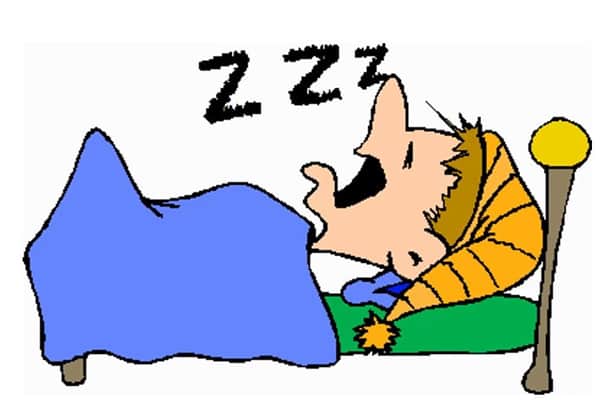Sleep is one of the basic human requirements. It plays a significant role in maintaining a person’s well-being and good health throughout his life. Getting adequate quality sleep at night can help in protecting one’s physical health, mental health, safety, and quality of life. Let us see how long can you go without sleep
Sleep deprivation can cause various physical, emotional and mental problems. Some of these are heart diseases, stroke, high blood pressure, diabetes, slow healing process, fatigue, clumsiness, daytime sleepiness, weight gain or weight loss, reduced decision-making ability, stress, headaches, short temper, hand tremor, hallucinations, memory lapse, memory loss, confusion, etc.
It is a fact that one can survive longer without food than without sleep. So, how long can you go without sleep? This article provides you with comprehensive information on this matter.
How Long Can You Stay Awake?
Research On Prolonged Sleep Deprivation:

Here are some studies where human beings and rats were tested for their tolerance to stay awake for prolonged times.
However, none of these studies effectively provide information as to how long can a human go without sleep? This is because no one in these studies died definitively from lack of sleep alone. There were other factors too involved. It is ethically tricky to inspect those boundaries under lab conditions.
In the year 1965, Randy Gardener, a 17-year-old voluntarily went without sleep for a high-school science fair project. He stayed awake for about 11 days (264 hours). He was a mere vegetable with open eyes before he fell asleep on the 11th day. But this study does not provide info on at what point he would have died if he had continued to stay awake.
Another renowned experiment on testing the ability to stay awake was that made on rats at the University of Chicago in the 1980s. Researchers monitored them keenly and jolted these rodents to keep them awake every time they started to fall asleep.
It was found that these animals died within a period of two weeks. But even this experiment has its shortcomings. For, one does not know whether the rats died of utter sleep deprivation alone. Their deaths may also have links to increased blood pressure and stress hormone (Cortisol) levels as these animals were woken up from their sleep constantly.
Apart from these programmed studies, some reports have also been made of natural sleep deprivation situations. One of these is that of the Air Force Pilots who go without sleep for three or four days.
It has been seen that they go delirious that they crash their planes by falling asleep. Even those who remain awake for single nights have reported having impaired driving abilities just as if they were drunk.
Human Medical Disorders That Cause Sleep Deprivation
There are some rare medical sleep deprivation disorders in human beings. These again arises different, surprising answers to the question how long can you go without sleep? These disorders are discussed below:
Morvan’s Syndrome Or Morvan’s Fibrillary Chorea
Morvan’s syndrome or Morvan’s fibrillary chorea is a rare kind of autoimmune disease where weakness, severe sleep loss (agrypnia), cramping, excessive sweating, irregular multiple contractions of the long muscles, pain, weight loss, twitching, periodic hallucinations, delirium, hyperhidrosis, and pruritus are experienced for months or even years together. In the year 1974, in France, neurobiologist Michel Jouvet and co, studied a 27-year-old man with Morvan’s syndrome.
They have recorded that he did not sleep for months together. Neither he feels tired or sleepy, nor did he exhibit memory, anxiety or mood disorders. However, between 9 to 11 pm, almost every night, he experienced visual, auditory, somesthetic (touch sense), and olfactory hallucinations over a period of 20 to 60 minutes. He also experienced pain and vasoconstriction in his toes and fingers during this time. Recent studies say that the Morvan’s syndrome is linked to serum antibodies that are directed against certain potassium channels in the membranes of cells and nerves.
A year before, a 26-year-old man from China died after going sleepless for 11 consecutive days in an attempt to watch all the games of the European Cup. However, reports say that he was constantly smoking and drinking alcohol during this period. This has made it difficult for us to ensure that sleep deprivation was the prime cause of his death.
Fatal Familial Insomnia

Fatal familial insomnia or FFI is a rare, autosomal dominant, and eventually terminal, genetic sleep deprivation related disease. The affected individual initially starts experiencing insomnia. With the fast progressiveness in the disease further symptoms including weight loss, hallucinations and dementia emerge before the death of the victim.
A famous case of FFI is that of Michael Corke, a music teacher in Chicago who in the year 1992 died after approximately six to thirty months of sleep deprivation. However, it has been found that deaths from FFI result out of multiple organ failures, rather than from sleep deprivation. The pathology of FFI includes degeneration of thalamus and other parts of the brain, hypertension, and hyperactivity of the sympathetic nervous system, tremors, fever, weight loss, stupor, and disturbed endocrine systems.
36 Amazing Facts About Sleep
Here are some lesser known facts about sleep that will help you gain better insights on how long can you go without sleep.
| 1 | Most of the information on sleep has been learned in the recent past (just 25 years back!). |
| 2 | Sleep deprivation in 18 to 24-year-olds made them experience impaired performance which is lesser than that of older adults. |
| 3 | Experts state that 24 hours internet accessibility is one of the most attractive sleep distractions out there. |
| 4 | The longest recorded consecutive sleep deprivation is 18 days, 21 hours, and 40 minutes. It was accomplished on a rocking chair marathon. The individual reported experiencing paranoia, hallucinations, slurred speech, impaired memory, concentration lapses, and blurred vision during this period. |
| 5 | Without keen medical supervision, it is impossible to know if an individual is awake. Individuals can nap even with opened eyes and even unconsciously. |
| 6 | At night, if an individual takes less than five minutes to fall asleep, he is sleep deprived. The ideal period for falling asleep is between 10 to 15 minutes. This means that you are not very exhausted and tired enough to fall into a deep sleep when you start sleeping. |
| 7 | A normal new baby causes 400 to 750 sleepless hours for her parents during the first year of her life. |
| 8 | REM (rapid eye movement) of sleep was discovered only in 1953. Until then sleep researchers did not get involved in such studies partly because they did not want to waste paper. |
Living is a sickness to which sleep provides relief every sixteen hours. It’s a palliative. The remedy is death.
| 9 | REM sleep happens in fragments generally after approximately 90 minutes of falling asleep. The REM sleep totals for about a period of 2 hours each night. |
| 10 | Earlier, it was believed that dreams occurred only during REM sleep. But the fact is that dreams happen both inside and outside REM sleep phases. It is also possible that one dreams at each and every moment of his sleep. |
| 11 | REM dreams are bizarre, and non-REM dreams are thought-like and repetitive with some imaginations. |
| 12 | Some kinds of eye movements during REM sleep correlate with specific movements in dreams. This suggests that at least some portion of the dream process resembles watching a movie. |
| 13 | Some other species have similar sleep cycles to that of humans, but studies haven’t yet revealed whether these species also dream. |
| 14 | It has been found that elephants lie down during REM sleep, while their non-REM sleep occurs when they are standing. |
| 15 | There scientists who believe that human beings dream to plant life experiences in their long term memory. This means that one dreams of those things that are worthy of being remembered. Another group of scientists has opposing beliefs. That is, they believe that humans dream of those things that are worthy of being forgotten. This is to eradicate those overlapping memories that will accumulate in our brains otherwise. |
| 16 | Dreams are not purposeful but exist as a meaningless by-product of consciousness and sleep. |
| 17 | REM sleep may aid in the maturing of the developing human brains. Studies have shown that premature babies have seventy-five percent REM sleep, which is ten percent more than their full-term counterparts. |
| 18 | A sleep research in humans in the year 1998 showed a bright light shining on the knees’ back that reset the sleep-wake clock of the brain. Scientists, however, are unable to explain this phenomenon. |
| 19 | Researchers from the British Ministry of Defense have successfully reset the biological clock of their soldiers to help them stay awake for 36 hours during the war times. They use special spectacles with embedded tiny optical fibers. These spectacles extend a ring of bright white light similar to sunrise around the retinas of the soldiers. This fools their bodies into believing that they have just awoken from night’s sleep. This system was used first on the US pilots during Kosovo bombing. |
| 20 | Staying awake for seventeen consecutive hours causes a reduction in the performance of an individual as if his blood alcohol level has gone up to 0.05%. |
| 21 | Sleep deprivation related human errors played a major role in contributing to historical accidents such as the Exxon Valdez oil spill of Alaka (1989), the Chernobyl nuclear accident, and the Challenger space shuttle disaster. |
| 22 | One in every six fatal accidents results from fatigue says the NRMA. |
| 23 | Even if someone who is sleeping at night does awake due to noise exposure, it can suppress the functionality of his immune system. The human sleep cycle can experience a big disruptive effect if at the first and last two hours of sleep strange noise and noise is heard. |
| 24 | Some people have a natural alarm clock in them, which helps them to wake up at approximately the same time when they want to. This is because of a burst of adrenocorticotropin, the stress hormone. Scientists say that this is a reflection of an unintentional expectation of stress of waking up. |

| 25 | Certain sleeping medications like the barbiturates are known for suppressing your REM sleep. This can be hazardous over a prolonged period of using it. |
| 26 | In cases of insomnia that follows bereavement, consumption of sleeping pills can distort grieving. |
| 27 | Small luminous rays emitted by a digital alarm clock are enough to distort the sleep-wake cycle even if the sleeper does not wake up. This light is enough to turn off the brain’s “neutral switch.” This in turn causes the important sleep chemical levels to go down within a matter of some minutes. |
| 28 | To fall asleep, one must cool off his body, as there is a close association between the brain’s sleep-wake cycle and the body temperature. This is the reason why we experience restless sleep at hot summer nights. |
| 29 | Following five consecutive nights of partial sleep deprivation, alcoholic drinks will have higher effects on your body. Studies say that you will feel the same effect as six drinks when you have just drunk three. |
| 30 | Studies say that we human beings sleep for about three hours lesser than our primates such as rhesus monkeys, chimps, baboons and squirrels that sleep for 10 hrs. |
| 31 | Only in the non-REM sleep snoring occurs. |
| 32 | It has been seen that 10% of snorers have a disorder called sleep apnea. This disorder makes the sufferer have stopped breathing nearing 300 times each night. This heightens one’s risk of suffering a stroke or heart attack. |
| 33 | Children and teenagers require approximately 10 hours of sleep each night; average adults (25 to 55 years age) need eight hours, and elderly (above 65 years) need six hours. |
| 34 | Certain studies show that women have more (about an hour extra) sleep needs than men. Not receiving this amount of sleep makes them more prone to depression than men. |
| 35 | During research, it was found that the candidates who were deliberately sleep deprived had better mood, physical performance, and alertness initially. But, after the initial few days, this dropped off. |
| 36 | During the Victorian era when no electric lights existed, people slept for 9 to 10 hours at night by the sunrise and sunset. Their diaries bear evidence to this. |
Rounding it all up, sleep science is a recently developed disciple. So, there is no availability of point info on exactly how long a human can go without sleep. However, it is well established that sleep is a very important process that has a significant on the overall well-being and good health of an individual. Sleep deprivation can result in various adverse side effects. So, it is unwise to neglect one’s sleep needs.



